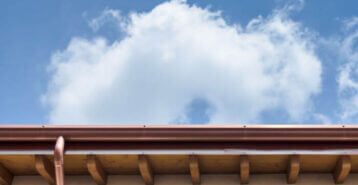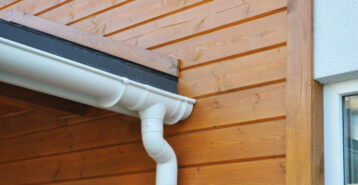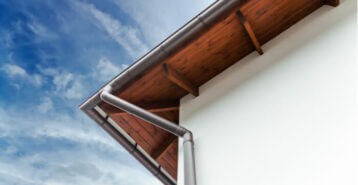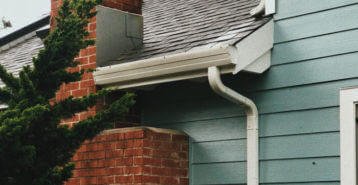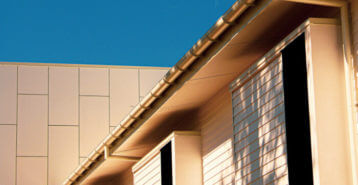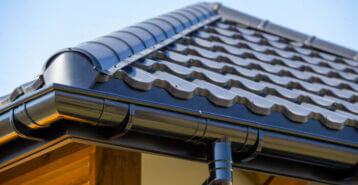Aluminum Gutters Installation: What to Know
Aluminum gutter installation costs vary based on location and the contractor you hire. Key factors that influence pricing include home size, installation complexity, and the number of downspouts needed to efficiently direct water from the roof to the ground. As a rough rule of thumb, you can estimate how many linear feet of guttering you will need by dividing the square footage of your home by 10. For instance, a 3,000-square-foot home would need about 300 linear feet of gutters.
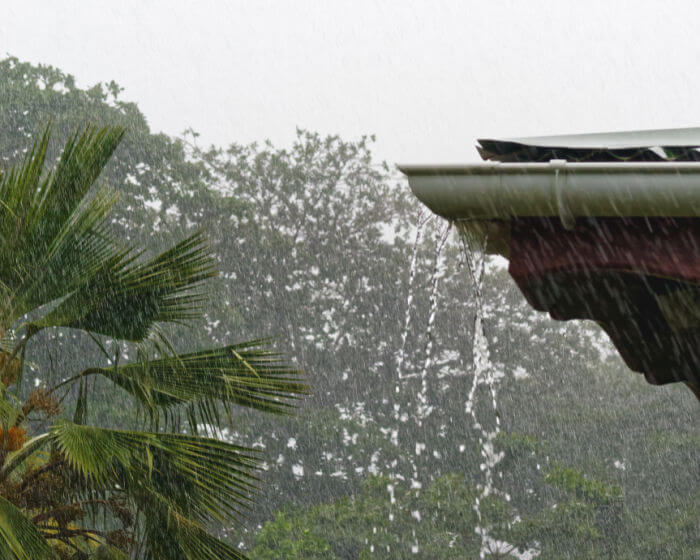
Cost of Aluminum Gutters
On average, aluminum gutters typically cost between $8.80 to $27.90 per linear foot to install. Aluminum downspouts cost between $136 and $248 on average per downspout installed. Most homes require two to four downspouts depending on the roof structure and stories. You also may be responsible for the cost of important gutter accessories, such as end caps, hangars, brackets, elbows, flashing, and splash blocks.
The total cost to install aluminum gutters on a 2,500-square-foot home now ranges from $1,845 to $5,835, depending on material quality, labor rates, and additional components such as downspouts and gutter guards.
Labor costs for aluminum gutter installation in the U.S. average $3.50 to $11 per linear foot. For a 2,500-square-foot home requiring approximately 150 feet of gutters, labor expenses range from $525 to $1,650. Labor prices could be lower for gutters on a simple single-story A-frame roofline, or higher for a complicated two-story hip-and-valley roofline.
| Material | Average cost |
|---|---|
| Aluminum gutters | $8.25 - $26.40 per linear ft. |
| Aluminum downspouts | $136 - $248 per unit |
| Aluminum end caps | $1.88 - $6.50 per unit |
| Aluminum gutter guards | $3.14 - $5.72 per linear ft. |
| Labor and installation | $4 - $12 per linear ft. |
| Estimated grand total for 2,500 sq. foot home | $1,760 - $5,580 |
Discuss aluminum gutter materials and labor costs with at least three to four reputable gutter installation companies prior to starting your project. You also can use our handy gutter installation cost calculator to get a baseline idea of how much you might pay for your new aluminum gutters.
Benefits of Aluminum Gutters
It’s no coincidence that about 70% of all gutters manufactured in the U.S. are made from aluminum. The metal offers many inherent benefits to home gutter systems, including:
- Corrosion Resistance: Aluminum contains almost no iron, which is responsible for rusting in other types of metals when they are exposed to oxygen and water. Not only do aluminum gutters not rust, but they actually form a film of aluminum oxide that provides enhanced water protection.
- Cost-Effective: Aluminum gutters offer homeowners a solid value option compared to more expensive copper gutters and less expensive (and less durable) vinyl PVC gutters.
- Durability: Aluminum gutters can have a life expectancy of 30 years or even longer when properly maintained.
- Lightweight: Aluminum’s popularity was borne in part from its light weight compared to copper or galvanized steel gutters.
Seamless vs. Sectional Aluminum Gutters
The majority of U.S. homes have seamless (rather than sectional) aluminum gutters. This is because seamless aluminum gutters are sturdier, longer-lasting, and better protect the home compared to sectional gutters.
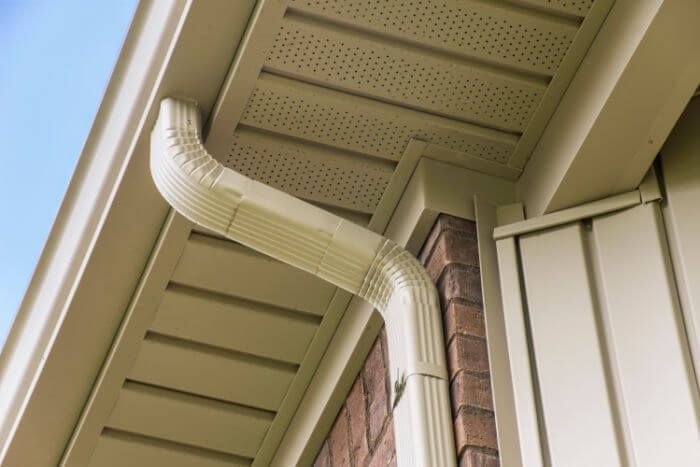
Aluminum seamless gutters are custom-formed onsite to fit the exact dimensions of your home’s roofline. On the other hand, sectional aluminum gutters — the less common type — are premade gutter lengths that are assembled in the field. Although all seams are covered with a sealant, sectional gutters are usually DIY projects and more prone to leakage than their seamless counterparts.
Styles of Aluminum Gutters
There are two main styles of aluminum gutters from which to choose: half-round and K-style. Below we’ve listed the main features and pros and cons of each style.
K-Style Aluminum Gutters
This style of gutter got its name because it resembles the capital letter “K” when viewed from the side. The design helps provide strength and rigidity, especially when the gutter is filled with snowmelt or rainwater. K-style gutters are the most widely used style of gutter in the U.S. They pair well with contemporary and modern architectural styles.
Pros:
- K-style gutters are deeper than half-round gutters, so they can carry more rainwater.
- They have a flat back that can be nailed directly to your roof’s fascia, which makes them easy to install. This could potentially help you save on labor costs.
- The extra rigidity lends itself to increased durability and longevity.
Cons:
- The shape can accumulate debris faster than half-round gutters.
- They can be more difficult to clean.
K-style gutters are most commonly sold in 5-and 6-inch widths, but they can be manufactured up to 8 inches wide.
Half-Round Aluminum Gutters
Half-round aluminum gutters are shaped like half a barrel or circle. They’re usually featured on older homes or historical Victorian architecture, although they can also work well with homes that have brick or natural stone siding.
Pros:
- Water moves faster through the trough of half-round aluminum gutters.
- The half-circle shape makes them easy to clean.
- Water won’t collect or pool, so there tends to be fewer issues with leakage.
Cons:
- Half-round gutters are a bit more shallow in depth than K-style gutters, so they don’t carry as much rainwater. This could potentially be an issue for climates with more rainfall.
- They are not as popular as K-style gutters, so it may be harder to source them.
- They can be a bit more difficult to install, which can drive up the price of labor.
Half-round aluminum gutters can be made in widths ranging from 4” to 8,” but 5” and 6” are the most common sizes.
Note that many gutter contractors will only carry K-style gutters, as they are the most widely manufactured style in the U.S. Be sure to discuss which style is best suited for your home with a professional contractor.
Aluminum vs. Vinyl Gutters
In this section, we will compare and contrast aluminum gutters and vinyl gutters — another popular material — to help homeowners decide which type best meets their needs.
Vinyl gutters, also known as PVC gutters, consist of polyvinyl chloride, the third most widely used plastic globally. These gutters offer several benefits:
- Durability: They will never rust or corrode.
- Lightweight: This feature makes them easy to handle during installation.
- Cost-Effective: Vinyl gutters average $6.33 to $32.40 per linear foot, which is cheaper than aluminum ($8.80 to $27.90) and steel gutters ($8.80 to $36.90).
- Aesthetic Appeal: They resist dings and dents, and scratches blend in due to their uniform color.
However, vinyl gutters also have drawbacks:
- Brittleness: Long-term exposure to harsh weather can make them brittle and reduce durability.
- Wind and Rain Resistance: Their lightweight nature means they cannot withstand extreme winds, snowstorms, or heavy rainfall as effectively as aluminum gutters.
- Installation Time: Sections snap together, making installation more time-consuming.
- Potential for Leaks: Multiple seams can lead to leaks.
Overall, vinyl gutters fit well in residential markets, especially in drier, mild climates with light rainfall and little snow. Conversely, if you live in an area with harsh weather, aluminum gutters provide better longevity and a higher return on investment.
Choosing Gutter Guards
Gutter guards are often an essential element of a well-performing gutter system. Gutter guards are screens or covers that are installed on top of the gutter to prevent leaves, twigs, and other debris from accumulating in the gutter trough.
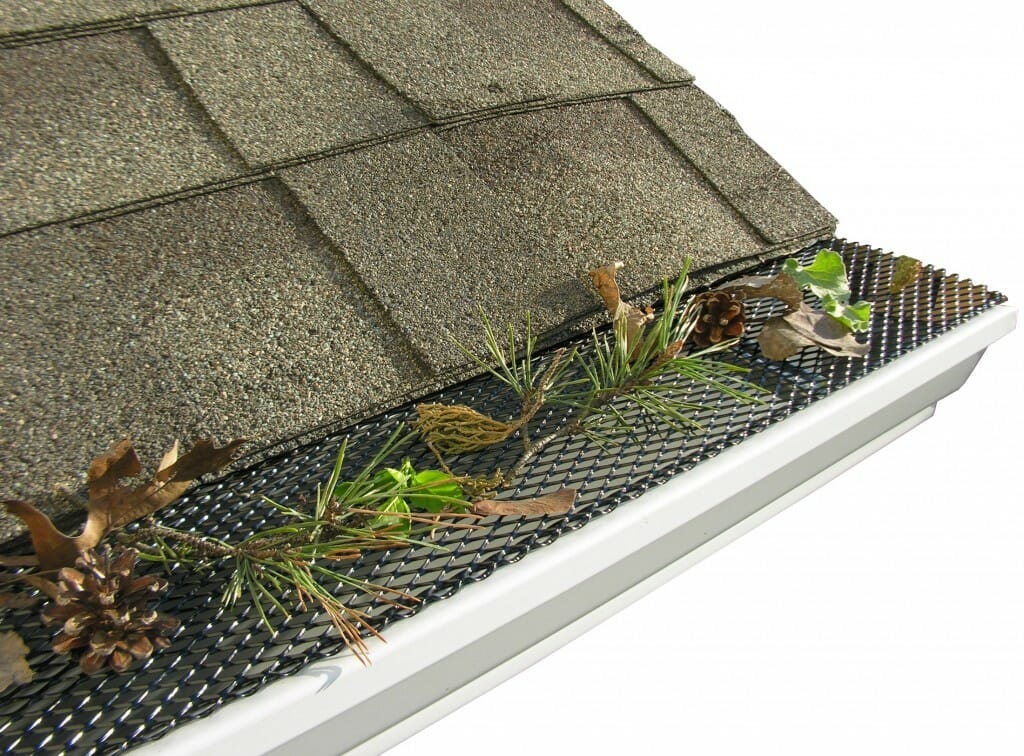
Installing Aluminum Downspouts
All gutters need downspouts to direct water from the roof to the ground, typically every 40 feet for effective drainage.
Contractors recommend pairing aluminum downspouts with aluminum gutters for a cohesive look. You can find downspouts in styles like rectangular (for K-style gutters) and round (for half-round gutters). They usually come in 10-foot lengths and widths between 3” and 6.” Aluminum downspouts cost $136 to $248 per unit.
You’ll also need additional accessories like elbows, brackets, and splash blocks to secure the downspouts. Consult a gutter contractor to select the right width for optimal water flow.
Finding a Reputable Local Gutters Contractor
Once you’re ready to install aluminum gutters on your home, the next step is to get in touch with local contractors. Modernize always recommends comparing at least three to four quotes before making a final decision. This will help you find the best price and professional for your project.
Click the button below to connect with reputable local contractors so you can start the vetting process. Use our network of trustworthy professionals to make getting your gutters project started easier.
Compare top-rated gutters pros in your area.
Read real homeowner reviews, explore qualifications, and view promotions. Modernize makes it easy to browse professionals and find one that will be perfect for your project.







